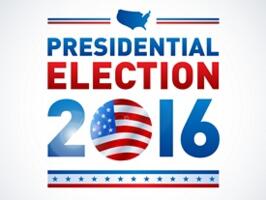Hillary Meter Drops Dramatically
In the face of increasing legal questions about the safety of secrets on the private e-mail server she used as secretary of State and of a vigorous intraparty challenge from Bernie Sanders, belief that Hillary Clinton is likely to be next year's Democratic presidential nominee has dropped noticeably over the past month.
The latest Hillary Meter shows that 63% of Likely U.S. Voters believe that Clinton is likely to be the next Democratic presidential candidate, but just 26% say it is Very Likely. That compares to 78% and 43% a month ago. Thirty percent (30%) consider that outcome unlikely, with 11% who feel it is Not At All Likely. That overall figure is up 10 points from the previous survey. (To see survey question wording, click here.)
Among likely Democratic voters, 74% think Clinton is likely to be their party’s nominee, but that’s down from 87% in the previous survey and 93% earlier in July. Eighteen percent (18%) of Democrats think Clinton is unlikely to be the nominee. The latest findings include 35% who say Clinton is Very Likely to be the nominee, down from 53% a month ago, but still just four percent (4%) who say that scenario is Not At All Likely.
Last month, we introduced this year’s edition of the Hillary Meter to regularly update public perceptions of the former first lady on her march to the White House. Why a Hillary Meter and not one for, say, Jeb Bush or Donald Trump? Because for one thing, Clinton is far and away the leader in the race for next year’s Democratic nomination, while the winner of the Republican race is anyone’s guess. Secondly, the former first lady, U.S. senator and secretary of State is an internationally known and highly polarizing figure – greatly admired by many on the left, extremely disliked on the right – who may end up being the nation’s first woman president.
Fifty-six percent (56%) of all voters still view Clinton as politically liberal, showing no change from last month. Only seven percent (7%) say she is conservative, while 27% consider her a moderate. In the first Hillary Meter – in April 2005 – 43% said Clinton was liberal, eight percent (8%) conservative and 34% moderate.
(Want a free daily e-mail update? If it's in the news, it's in our polls). Rasmussen Reports updates are also available on Twitter or Facebook.
The survey of 1,000 Likely Voters was conducted on August 13 and 16, 2015 by Rasmussen Reports. The margin of sampling error is +/- 3 percentage points with a 95% level of confidence. Field work for all Rasmussen Reports surveys is conducted by Pulse Opinion Research, LLC. See methodology.
Just 37% of all voters trust Clinton. Two federal inspectors general have asked the U.S. Justice Department to open an investigation into how she handled sensitive information on her private e-mail account as secretary of State. Most voters continue to have national security concerns about Clinton’s behavior but doubt that the federal government will do anything about it.
Seventy-eight percent (78%) of Republicans and 57% of voters not affiliated with either major political party believe Clinton is a liberal, but just 35% of Democrats agree. A plurality (44%) of voters in her party still views Clinton as a moderate.
Self-described politically liberal voters consider Clinton more of a moderate than a liberal. Among moderates, 45% say Clinton is liberal, while 37% think she’s a moderate. Seventy-eight percent (78%) of conservatives consider her a liberal.
All of Clinton’s challengers for the Democratic nomination have had name recognition problems at the early stage of the campaign, but it remains to be seen whether that has changed.
Democrats are planning to hold six debates for their 2016 presidential candidates, but at least two of the candidates – Sanders and Martin O’Malley - say that’s not enough. They feel a smaller number of debates benefits Clinton by keeping Democratic voters from getting to know them better. Most Democrats, however, think six debates are about right.
The controversies surrounding Clinton as well as the surge in support for Sanders are worrying some Democrats. Some have begun pushing Vice President Joe Biden to run in 2016, but only 40% of Democratic voters think he should do so.
Most voters like Clinton’s ambitious plan to combat global warming but admit the issue isn’t of high importance to their voting decisions.
Additional information from this survey and a full demographic breakdown are available to Platinum Members only.
Please sign up for the Rasmussen Reports daily e-mail update (it’s free) or follow us on Twitter or Facebook. Let us keep you up to date with the latest public opinion news.
The survey of 1,000 Likely Voters was conducted on August 13 and 16, 2015 by Rasmussen Reports. The margin of sampling error is +/- 3 percentage points with a 95% level of confidence. Field work for all Rasmussen Reports surveys is conducted by Pulse Opinion Research, LLC. See methodology.
Rasmussen Reports is a media company specializing in the collection, publication and distribution of public opinion information.
We conduct public opinion polls on a variety of topics to inform our audience on events in the news and other topics of interest. To ensure editorial control and independence, we pay for the polls ourselves and generate revenue through the sale of subscriptions, sponsorships, and advertising. Nightly polling on politics, business and lifestyle topics provides the content to update the Rasmussen Reports web site many times each day. If it's in the news, it's in our polls. Additionally, the data drives a daily update newsletter and various media outlets across the country.
Some information, including the Rasmussen Reports daily Presidential Tracking Poll and commentaries are available for free to the general public. Subscriptions are available for $4.95 a month or 34.95 a year that provide subscribers with exclusive access to more than 20 stories per week on upcoming elections, consumer confidence, and issues that affect us all. For those who are really into the numbers, Platinum Members can review demographic crosstabs and a full history of our data.
To learn more about our methodology, click here.





